Count di Luna, meanwhile deceased, had two sons. One day a gypsy was discovered standing beside the cradle of the younger son. When the child subsequently became ill, the woman was condemned to death at the stake for being a witch. The gypsy’s daughter, Azucena, thereupon abducted Luna’s younger son in order to burn him to death in the same place and thus take revenge for her mother’s death. However she mistook her own son for the boy she had abducted. In his place she raised Luna’s younger son as her own child and called him Manrico.
Civil war has broken out in Spain in connection with the crown of Aragon. Luna’s elder son is now the Count di Luna and is fighting on the side of the king. Manrico has joined the rebels.
Part One: The Duel
Ferrando, a captain in Luna’s army, tells the men in his service the story of the burning of the old gypsy and her daughter’s act of revenge. He is convinced that the old woman’s spirit is still haunting the earth.
Leonora is awaiting the arrival of her favourite suitor, the troubadour Manrico. She tells Ines how she met him at a tournament. Count di Luna, who is also in love with Leonora, declares his love. When Manrico’s voice is heard and Leonora hurries to meet him, she finds Luna, whom she has mistaken for Manrico in the darkness. Manrico and Luna realize that they are not only rivals for Leonora’s affection but also political opponents. They challenge each other to a duel.
Part Two: The Gypsy
Manrico has defeated Luna in the duel but was held back from killing him by an inner voice. In the ensuing struggle with Luna’s men he has been wounded. Azucena tells him the story of how her mother was burnt at the stake and her own act of revenge in which she burnt her own child instead of Luna’s son. She reacts with excuses to Manrico’s doubts and questions as to whether he is really her son. A messenger announces that Leonora, believing Manrico to be dead, has decided to enter a nunnery. Manrico decides to prevent this from happening.
Leonora mourns the death of Manrico. Luna has also heard about his beloved’s plans to become a nun and intends to abduct her. Manrico and his men, however, successfully seize Luna’s weapons and flee with Leonora.
Part Three: The Gypsy’s Son
Manrico has taken refuge with Leonora in a castle, which Luna’s soldiers are preparing to storm. Azucena has been taken prisoner, accused of being a spy. Ferrando recognizes her as the gypsy who abducted the count’s brother. When Azucena desperately calls out for Manrico it becomes clear to Luna that he has the mother of his deadly enemy in his power.
Manrico and Leonora are preparing their wedding when Ruiz, a soldier in his service, informs them that Azucena has been taken prisoner. Manrico calls his followers to arms and sets out to free the woman he believes to be his mother.
Part Four: The Execution
Manrico’s attempt to free Azucena has failed. He has also been taken prisoner. When Leonora hears that Luna is planning to have mother and son executed she begs him to set Manrico free and offers herself as the reward for Luna’s mercy. The latter agrees. Leonora secretly takes some poison in order not to have to keep her promise.
Manrico comforts Azucena, who longs to return home. Leonora urges him to flee immediately – she herself will remain, however. Manrico suspects what price she has paid to save him. Leonora dies. Luna realizes he has been deceived. He has Manrico executed immediately and forces Azucena to watch. She discloses the truth to him: „He was your brother!“
Place: Biscay and Aragon (Spain)
Time: Fifteenth century.
Act 1: The Duel
Scene 1: The guard room in the castle of Luna (The Palace of Aljafería, Zaragoza, Spain)
Ferrando, the captain of the guards, orders his men to keep watch while Count di Luna wanders restlessly beneath the windows of Leonora, lady-in-waiting to the Princess. Di Luna loves Leonora and is jealous of his successful rival, a troubadour whose identity he does not know. In order to keep the guards awake, Ferrando narrates the history of the count (Racconto: Di due figli vivea padre beato / "The good Count di Luna lived happily, the father of two sons"): many years ago, a gypsy was wrongfully accused of having bewitched the youngest of the di Luna children; the child had fallen sick, and for this the gypsy had been burnt alive as a witch, her protests of innocence ignored. Dying, she had commanded her daughter Azucena to avenge her, which she did by abducting the baby. Although the burnt bones of a child were found in the ashes of the pyre, the father refused to believe his son's death. Dying, the father commanded his firstborn, the new Count di Luna, to seek Azucena.
Scene 2: Garden in the palace of the princess
Leonora confesses her love for the Troubadour to her confidante, Ines (Cavatina:Tacea la notte placida / "The peaceful night lay silent"... Di tale amor / "A love that words can scarcely describe"), in which she tells how she fell in love with a mystery knight, victor at a tournament: lost track of him when a civil war broke out: then encountered him again, in disguise as a wandering troubadour who sang beneath her window. When they have gone, Count di Luna enters, intending to pay court to Leonora himself, but hears the voice of his rival, in the distance: (Deserto sulla terra / "Alone upon this earth"). Leonora in the darkness briefly mistakes the count for her lover, until the Troubadour himself enters the garden, and she rushes to his arms. The Count challenges his rival to reveal his true identity, which he does: Manrico, a knight now outlawed and under death sentence for his allegiance to a rival prince. Manrico in turn challenges him to call the guards, but the Count regards this encounter as a personal rather than political matter, and challenges Manrico instead to a duel over their common love. Leonora tries to intervene, but cannot stop them from fighting (Trio: Di geloso amor sprezzato / "The fire of jealous love" ).
Act 2: The Gypsy Woman
Scene 1: The gypsies' camp
The gypsies sing the Anvil Chorus: Vedi le fosche notturne / "See! The endless sky casts off her sombre nightly garb...". Azucena, the daughter of the Gypsy burnt by the count, is still haunted by her duty to avenge her mother (Canzone: Stride la vampa / "The flames are roaring!"). The Gypsies break camp while Azucena confesses to Manrico that after stealing the di Luna baby she had intended to burn the count's little son along with her mother, but overwhelmed by the screams and the gruesome scene of her mother's execution, she became confused and threw her own child into the flames instead (Racconto: Condotta ell'era in ceppi / "They dragged her in bonds").
Manrico realises that he is not the son of Azucena, but loves her as if she were indeed his mother, as she has always been faithful and loving to him - and, indeed, saved his life only recently, discovering him left for dead on a battlefield after being caught in ambush. Manrico tells Azucena that he defeated di Luna in their earlier duel, but was held back from killing him by a mysterious power (Duet: Mal reggendo / "He was helpless under my savage attack"): and Azucena reproaches him for having stayed his hand then, especially since it was the Count's forces that defeated him in the subsequent battle of Pelilla. A messenger arrives and reports that Manrico's allies have taken Castle Castellor, which Manrico is ordered to hold in the name of his prince: and also that Leonora, who believes Manrico dead, is about to enter a convent and take the veil that night. Although Azucena tries to prevent him from leaving in his weak state (Ferma! Son io che parlo a te! / "I must talk to you"), Manrico rushes away to prevent her from carrying out this intent.
Scene 2: In front of the convent
Di Luna and his attendants intend to abduct Leonora and the Count sings of his love for her (Aria: Il balen del suo sorriso / "The light of her smile" ... Per me ora fatale / "Fatal hour of my life"). Leonora and the nuns appear in procession, but Manrico prevents di Luna from carrying out his plans and takes Leonora away with him, although once again leaving the Count behind unharmed, as the soldiers on both sides back down from bloodshed, the Count being held back by his own men.
Act 3: The Son of the Gypsy Woman
Scene 1: Di Luna's camp
Di Luna and his army are attacking the fortress Castellor where Manrico has taken refuge with Leonora (Chorus: Or co' dadi ma fra poco / "Now we play at dice"). Ferrando drags in Azucena, who has been captured wandering near the camp. When she hears di Luna’s name, Azucena’s reactions arouse suspicion and Ferrando recognizes her as the supposed murderer of the count’s brother. Azucena cries out to her son Manrico to rescue her and the count realizes that he has the means to flush his enemy out of the fortress. He orders his men to build a pyre and burn Azucena before the walls.
Scene 2: A chamber in the castle
Inside the castle, Manrico and Leonora are preparing to be married. She is frightened; the battle with di Luna is imminent and Manrico’s forces are outnumbered. He assures her of his love (Aria: Ah sì, ben mio, coll'essere / "Ah, yes, my love, in being yours"), even in the face of death. When news of Azucena’s capture reaches him, he summons his men and desperately prepares to attack (Cabaletta: Di quella pira l'orrendo foco / "The horrid flames of that pyre"). Leonora faints.
Act 4: The Punishment
Scene 1: Before the dungeon keep
Manrico has failed to free Azucena and has been imprisoned himself. Leonora attempts to free him (Aria: D'amor sull'ali rosee / "On the rosy wings of love"; Chorus & Duet: Miserere / "Lord, thy mercy on this soul") by begging di Luna for mercy and offers herself in place of her lover. She promises to give herself to the count, but secretly swallows poison from her ring in order to die before di Luna can possess her (Duet: Mira, d'acerbe lagrime / "See the bitter tears I shed").
Scene 2: In the dungeon
Manrico and Azucena are awaiting their execution. Manrico attempts to soothe Azucena, whose mind wanders to happier days in the mountains (Duet: Ai nostri monti ritorneremo / "Again to our mountains we shall return"). At last the gypsy slumbers. Leonora comes to Manrico and tells him that he is saved, begging him to escape. When he discovers she cannot accompany him, he refuses to leave his prison. He believes Leonora has betrayed him until he realizes that she has taken poison to remain true to him. As she dies in agony in Manrico's arms she confesses that she prefers to die with him than to marry another (Trio: Prima che d'altri vivere / "Rather than live as another's"). The count has heard Leonora's last words and orders Manrico's execution. Azucena awakes and tries to stop di Luna. Once Manrico is dead, she cries: Egli era tuo fratello! Sei vendicata, o madre. / "He was your brother ... You are avenged, oh mother!"


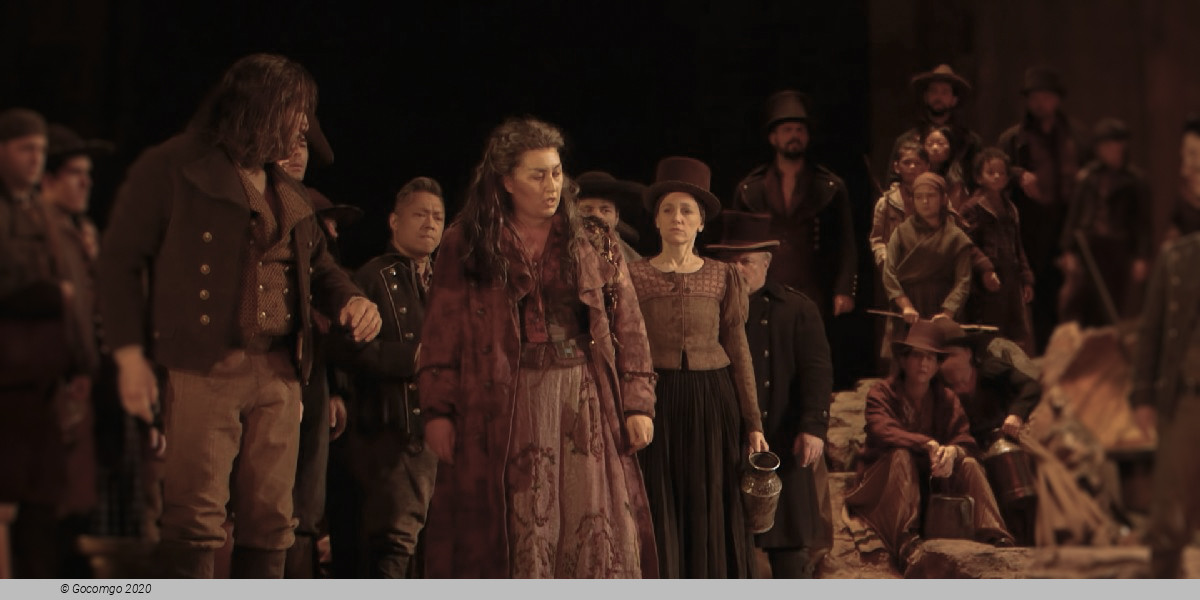
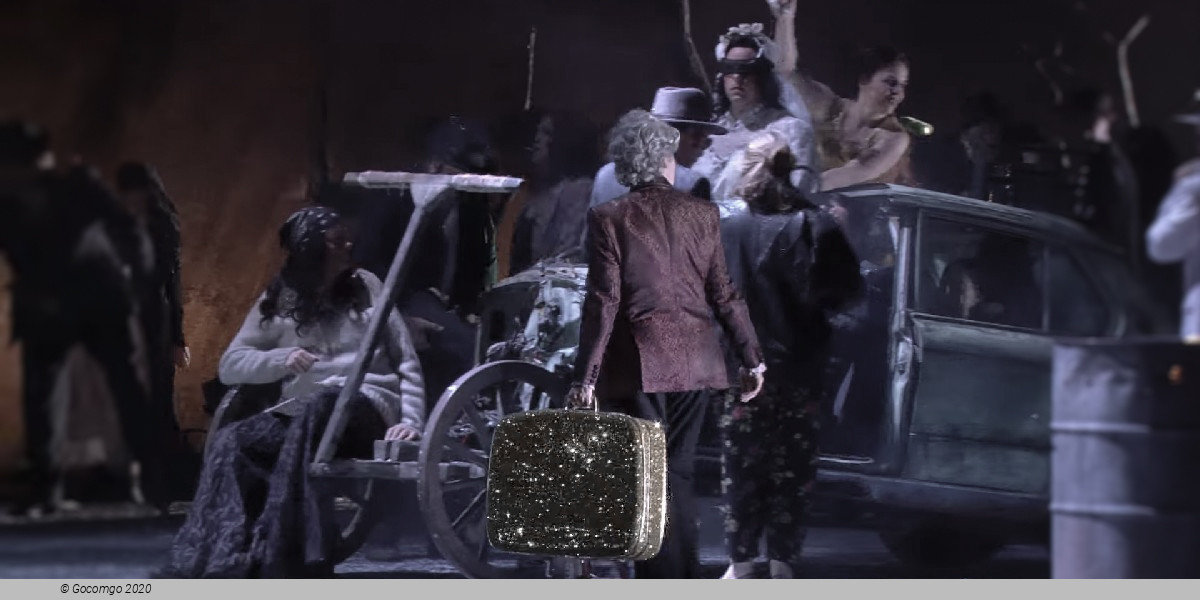
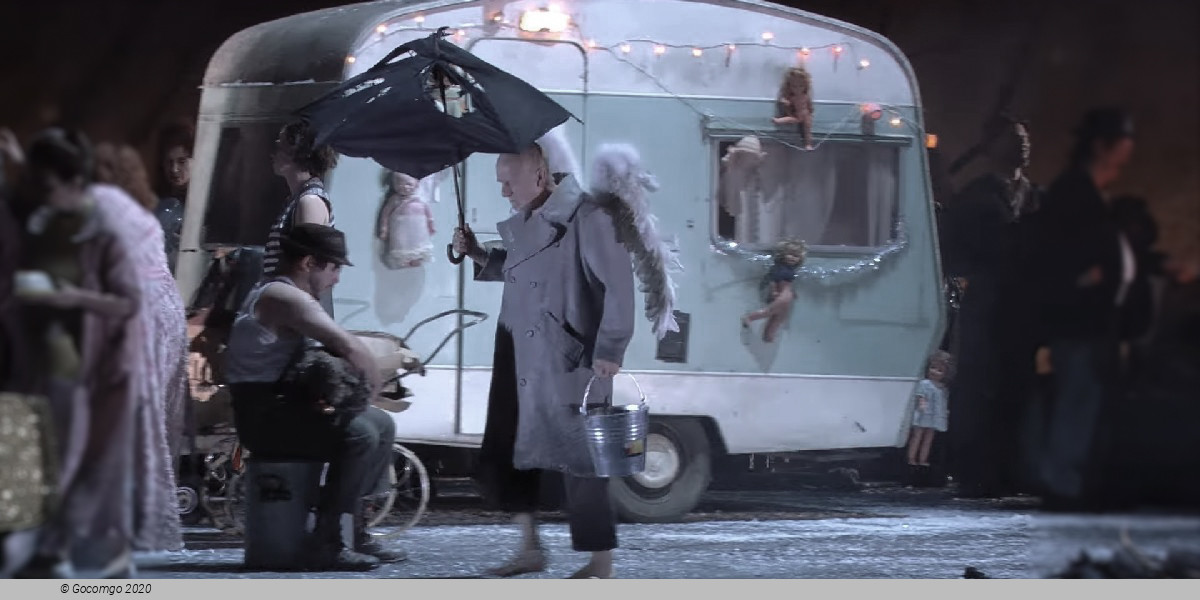
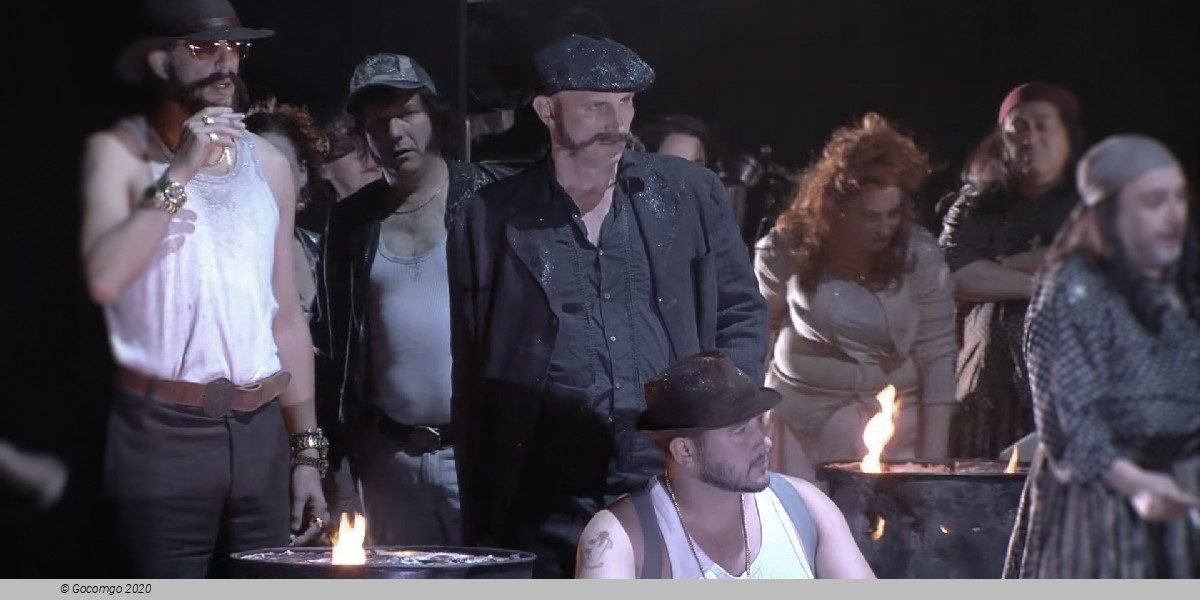
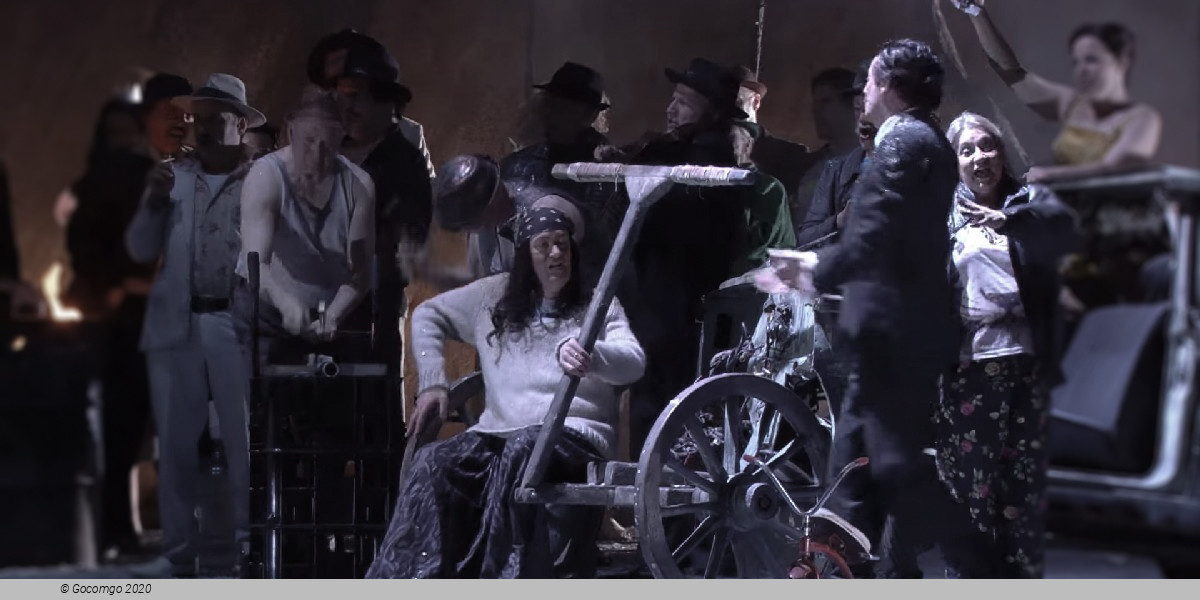
 Max-Joseph-Platz 2
Max-Joseph-Platz 2